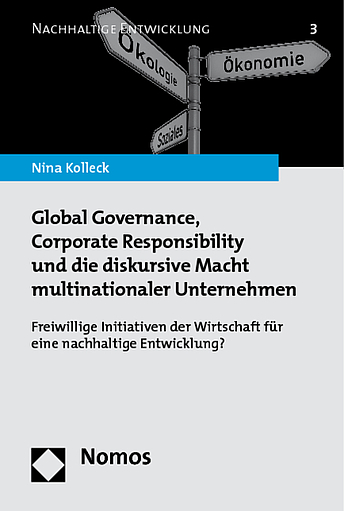englischThe book takes a look behind the scenes of corporate sustainability strategies and analyzes how and why multinational companies shape the discourse on sustainable development. In order to give answers to these questions it introduces an alternative theoretical and methodological approach that draws on constructivist ideas and implements the qualitative content analysis and a discourse analytical approach. It shows that corporations take part in the discursive processes to fill the concept of sustainable development with own interests and to legitimate ideas of the business community. Furthermore, the study finds another discrete type of influence that can be traced back to discourse-inherent rules the corporations have to deal with. By this means, the book seeks to make a methodological and theoretical contribution for social and economic sciences and for political praxis. While scholars observe the growing importance of the discursive power of business, there is a lack of theoretically based empirical studies in this field. At the same time, there exists an apparent need to analyze and assess the discursive use of development concepts by businesses as both the definitions and the operationalizations of these concepts have consequences for the identification of policy needs and outcomes. Equally, they are of crucial importance in terms of global and national problem solving, connected as well with highly political implications.
Das Buch wirft einen Blick hinter die Kulisse privatwirtschaftlicher Nachhaltigkeitsstrategien und analysiert wie und warum multinationale Unternehmen den Nachhaltigkeitsdiskurs gestalten. Für die Beantwortung der Fragen wird ein Forschungsdesign ausgearbeitet, das auf die qualitative Inhaltsanalyse sowie auf diskursanalytische Elemente zurückgreift und einen sozialkonstruktivistischen Ansatz implementiert. Es wird gezeigt, dass sich Unternehmen u.a. am Diskurs beteiligen, um das Konzept der nachhaltigen Entwicklung nach eigenen Interessen umzudeuten und um privatwirtschaftliche Ideen zu legitimieren. Darüber hinaus wird ein eigenständiger Typ des Einflusses identifiziert, der den Regeln des Diskurses selbst zugrunde liegt.
Auf diese Weise schließt die vorliegende Arbeit eine Forschungslücke in Bezug auf die diskursive Macht multinationaler Unternehmen und leistet einen Beitrag für die sozial- und wirtschaftswissenschaftliche Theorie- und Methodenbildung sowie für die politische Praxis. Nicht zuletzt kann der diskursive Gebrauch von nachhaltiger Entwicklung politische Prozesse beeinflussen und mit erheblichen Konsequenzen für das globale Governance-System einhergehen.


